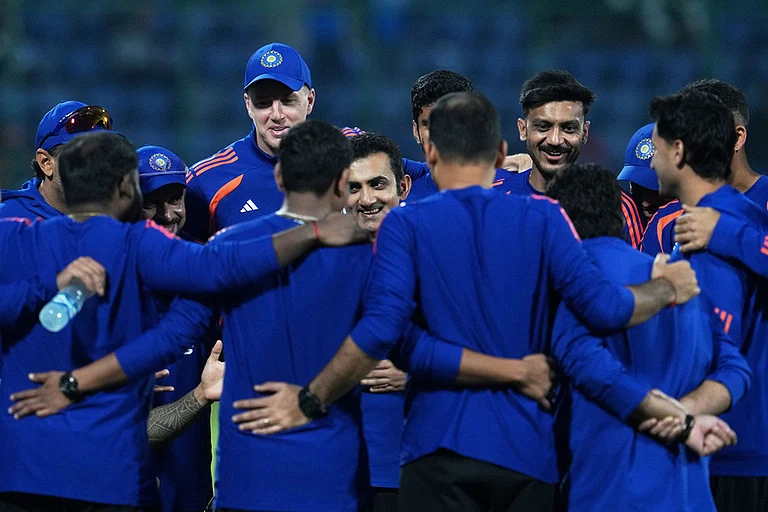It’s definitely not Byju’s that teaching our celebrities to be farmers, the multinational ed-tech company that doles out thousands of dollars every week to a uber-popular superstar of India’s Hindi film industry as a part of its aggressive marketing strategy to woo its target audience of millennials and Gen Z from grade 1 to the ones who are studying for competitive exams like CAT, JEE, NEET, GMAT, UPSC and banking exams.
His name is Shahrukh Khan. He is a TED speaker and he is not a farmer.
Last week, India’s farmers woke up to the breaking news of Khan’s 23-year-old daughter making a Rs 12.91 crore entry into the world of agriculture, discovering her green thumb right after acquiring luxurious farmland. She, who is yet to establish herself as a legit talent, bought an agricultural property in Alibaug’s Thal village. The property was registered in the name of Deja Vu Farm Pvt Ltd. Khan’s mother-in-law Savita Chibber and sister-in-law Namita Chibber are the directors of the company. According to IndexTap.com, the registration documents for this property describe her as an “agriculturist”. In Maharashtra, only an agriculturist —farmer or sharecropper— can acquire an agricultural land. The buyer may be anywhere from India. A non-agriculturist can purchase an agriculture land with the prior consent from the District Collector.
The star kid’s entry into the world of agriculture screams ‘privilege’ on farm-fresh organic steroids. While the rest of us struggle to save up for a mere square foot of land, these celebrity kids can casually drop millions on properties like it’s a game of Monopoly. Why does a child of a film star whose net worth is more than Rs 5,900 crore have to identify herself as an ‘agriculturalist’ in official records? How does tending to crops mutate into a glamorous hobby for the rich and famous? Is this a genuine passion for farming? Or is it just another elaborate ruse to play pretend and make us regular folks feel like she is one of us?
Born and brought up in Mumbai, she graduated from Ardingly College in London and perhaps has never set foot on a farm, let alone worked on or for one. Though she has called herself a farmer by profession. She is by no means one. The reason is easy to deduce: individuals categorised as ‘agriculturists’ in India are eligible for certain benefits and incentives when it comes to agricultural property and transactions, according to the Income Tax Rule of 1961. Furthermore, under Section 63 of the Bombay Tenancy and Agriculture Land Act, 1948, the transfer of property by sale, gift, exchange, or lease of any land or interest therein is not valid if that person is not an agriculturist or who is not an agricultural labourer. Restrictions over the purchase of agricultural land by non-agriculturists and tax exemption have always been in place in India in order to protect the cultivators from exploitation, absentee landlordism, and tax overburden, so that the relationship between land and the tiller is maintained. However, India’s ultra-rich and powerful people bend agrarian laws and regulations as a matter of muscle memory to protect their wealth, much to the outrage of the faceless, voiceless masses.
The film star and his daughter dearest seem to have learnt the tricks of the trade from the legendary megastar Amitabh Bachchan, the epitome of stardom and luxury, who purchased a huge plot of land in Pol, overlooking the Pavana dam near Lonavala in Maharashtra using the same signature method of operation, i.e., by describing himself as a ‘farmer’. After vociferous protests held by dispossessed farmers, he tried everything from forging documents to rushing to UP to buy land in Daulatpur to wriggle himself out of the ensuing legal and public relations mess. A case of how a dozen lies being told to cover up one lie.
Amitabh submitted an affidavit stating that he owned farmland in Barabanki in UP. To make this statement true, he used his political connections with the then ruling dispension in Lucknow to get land records fudged. When that got exposed, he rushed to Daulatpur village in UP to buy land. In June 2007, a Faizabad court ruled that the actor had got himself certified a farmer by forgery in Uttar Pradesh so that he could hold on to a 24-acre plot he had earlier bought near Lonavala. The plot in Daulatpur village was gram samaj land, reserved under panchayat laws for poor and landless peasants. The huge and grotesque mockery of the great actor reached its climax when he was forced to ‘return’ the land to the local gram samaj. How could one of India’s greatest cultural icons so kindly ‘return’ the land that he never owned?
Even Shahrukh Khan, the superstar whose daughter is our newest ‘agriculturist’ extraordinaire in the murky world of celebrity agriculturists isn't new to this. Back in 2018, Deja Vu Farms in Alibaug, owned by his close relatives, was probed and fined over the suspected use of unaccounted money. According to the official records, land owned by Deja Vu Farms was in complete possession of the actor, and the transactions were designed in such a way that Shahrukh would benefit from them in the end. It was reported that, until then, the company had not shown any income generated by farming. Upon further investigation, the questionable history of Deja Vu farms was brought to light. It was found that the company was first registered against Srinivas Parthasarathy and Somasekhar Sundaresan in 2004, but ownership was taken by Ramesh Chhiba and Savita Chhiba (Shahrukh Khan’s parents-in-law) and Moreshwar Rajaram Ajgaonkar on the very next day of the registration. Ajgaonkar, the only farmer (benamidar) among the directors, was replaced by Namita Chibba, Sharukh’s sister-in-law in 2011, confirming that Deja Vu Farm Company was a ploy for Shahrukh to acquire the land. Even today, the agricultural activities of the said company are unknown and the star-kid’s purchase has been registered under the same company.
Why do Shahrukh Khan, Amitabh Bachchan and their tribe of the ultrarich operate like this? In an interview titled Inside the Minds of the Ultrawealthy with The New York Times, Brad Klontza, a psychologist and certified financial advisor, says that for the rich, becoming successful is about breaking the rules. When they encounter a roadblock, it simply means they have to find another way. They have this feeling that rules don’t apply to them, and thus they act entitled. In many cases, like that of Amitabh and now Suhana, such entitlement comes at the cost of equality, the bona fide essence of democratic principles, and thus demands careful investigation and strict penalties.
Let’s take a moment to applaud the real heroes of agriculture—the unsung warriors who battle the elements, work the land with calloused hands, and face challenges that would make the star-kid’s farm-themed tea party seem like child’s play. These real farmers come from humble backgrounds and have dedicated their lives to feeding the nation. It’s quite a different story from the glamorous farm life of our celebrity agriculturists whose escapades in the land of agriculture highlight the stark disparities that plague our society. While the majority of us struggle to make ends meet, these high-networth-individuals prance around, buying fancy farms, and pretending to be farmers. It's like watching a Kardashian lecture us on financial responsibility. It just doesn't add up.
And let's not forget about the other celebrity enthusiasts who have jumped on the bandwagon of pretending to care for nature and the environment. Dharmendra, the Bollywood veteran and heartthrob of yesteryears, has also joined the club of celebrity landowners with his farmhouse in Lonavala. Owning a vast piece of land conveniently allows him to embrace the title of a nature lover. It seems that for these celebrities, owning a sprawling property is the perfect excuse to play environmentalists without getting their hands dirty.
Bollywood diva Shilpa Shetty Kundra has been vocal about her love for nature and healthy living. From sharing yoga routines to promoting eco-friendly products, she has built a brand around her supposed eco-consciousness. However, let's not forget that Shilpa Shetty Kundra also owns a luxurious farmhouse in Khandala. It's easy to preach about living in harmony with nature when you have your own slice of paradise away from urban chaos.
The outspoken Bollywood actress Kangana Ranaut is known for her strong opinions on various issues, including the environment. She has spoken about her interest in organic farming and even shared glimpses of her home garden on social media. However, it's essential to distinguish between genuine passion and performative gestures. Owning a farm or tending to a garden does not automatically make one an environmentalist. True environmentalism goes beyond personal spaces and requires a deeper commitment to sustainable practices on a larger scale.
Dharmendra, Shilpa Shetty Kundra, and Kangana Ranaut may engage in activities that appear environmentally friendly or farm-related. However, their endeavours more often than not lack the understanding, dedication, and real-life challenges that genuine agriculturists face. It's important to recognize the disparity between their privileged versions of eco-consciousness and the tireless efforts of those who genuinely work the land to feed our billion-plus population.
We mustn’t overlook the glaring hypocrisy displayed by these celebrities in their endorsement deals. While they preach about sustainability and environmental responsibility, they conveniently endorse soft drinks, pan masala, and instant noodles, which are far from eco-friendly. It's laughable how they can lecture us about the environment one moment and promote products that contribute to pollution and unhealthy habits the next. Pay cheques talk louder than principles.
It's clear that these celebrities use their privilege to appropriate the struggles of genuine agriculturists. They turn farming—a profession deeply rooted in hardship and resilience—into a mere accessory, much like a designer handbag they flaunt to showcase their supposed social consciousness. Farming for them is just another hobby, a way to project an image of simplicity and down-to-earth charm while living in their opulent mansions. The truth is, no matter how many photos they post on social media and how many press statements they release, their superficiality will never truly understand the realities faced by genuine agriculturists. They’ll never know the exhaustion of working the fields from sunrise to sunset, the anxiety of uncertain weather conditions, or the financial struggles that come with the profession.
So, bravo to the newbie farm landowner and her fellow celebrity farmers for enlightening us with their agricultural escapades. It's awe-inspiring to see how effortlessly they can transform a noble profession into a trendy pastime. Who needs real passion and dedication when you can simply buy your way into a new hobby? Just another day in the surreal world of celebrity privilege. But let's not be fooled—behind the Instagram filters and perfectly staged farm photos, the struggles of real farmers continue, unnoticed and unappreciated.
(Basant Rath is a 2000-batch IPS officer working in Jammu and Kashmir since December 2001. His parents were farmers. Views expressed are personal.)
























